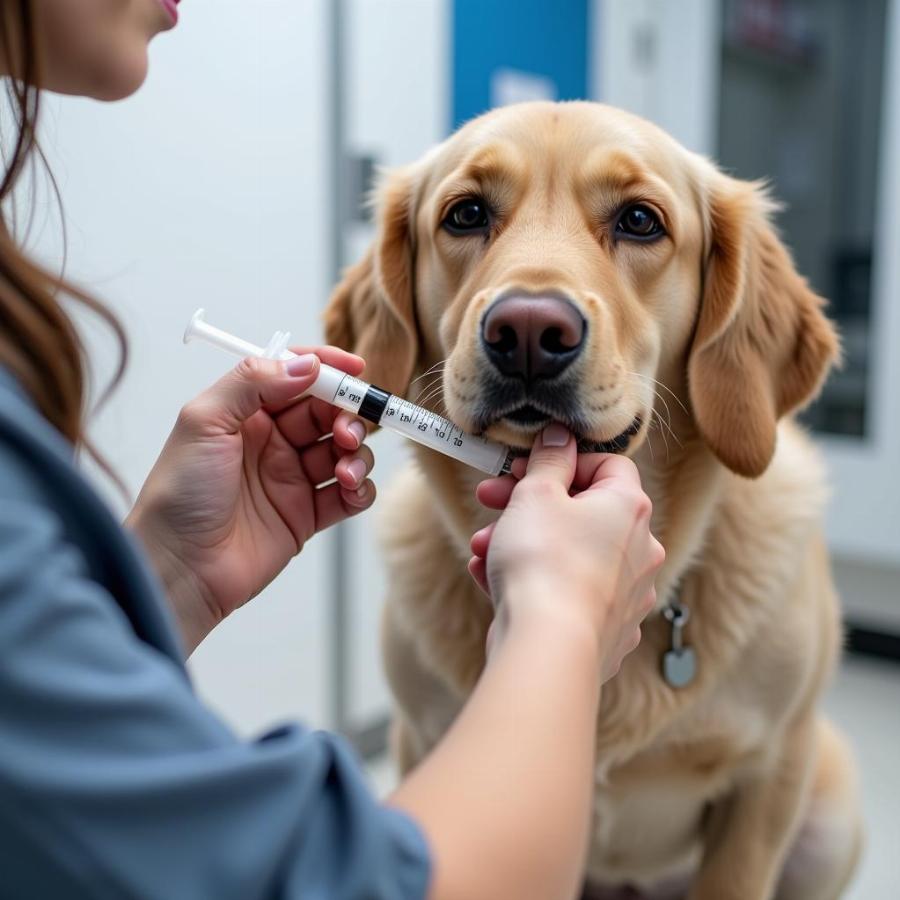Understanding the correct metronidazole dosage for dogs is crucial for effectively treating infections while minimizing potential side effects. This guide provides in-depth information on calculating the appropriate mg/kg dose, administration, potential side effects, and when to consult a veterinarian. It’s essential to always follow your veterinarian’s instructions regarding medication administration for your dog.
Understanding Metronidazole for Dogs
Metronidazole, often sold under the brand name Flagyl, is an antibiotic used to treat various bacterial and parasitic infections in dogs. It’s effective against anaerobic bacteria (bacteria that thrive in environments without oxygen) and certain protozoa. Common conditions treated with metronidazole include diarrhea, inflammatory bowel disease, and periodontal disease. However, determining the correct metronidazole dosage for dogs mg/kg is essential for successful treatment.
 Administering Metronidazole to a Dog
Administering Metronidazole to a Dog
Calculating the Correct Metronidazole Dosage for Dogs mg/kg
While the typical dosage range for metronidazole in dogs is 10-25 mg/kg, the precise metronidazole dosage for dogs mg/kg will be determined by your veterinarian based on several factors, including your dog’s weight, the severity of the infection, and the specific condition being treated. Never attempt to calculate or administer metronidazole without first consulting your veterinarian.
How to Calculate the Dose
Your veterinarian will provide you with the specific mg/kg dosage and frequency of administration. To calculate the total dose for your dog, you’ll need to know their weight in kilograms. Multiply your dog’s weight in kilograms by the prescribed mg/kg dosage. For example, if your dog weighs 10 kg and the prescribed dosage is 15 mg/kg, the total dose would be 150 mg.
Metronidazole Administration: Oral and Injections
Metronidazole is available in both oral (tablet and liquid) and injectable forms. Oral administration is typically preferred for routine treatments. Your veterinarian will guide you on the appropriate method of administration for your dog’s specific case.
What if I Miss a Dose?
If you miss a dose, administer it as soon as you remember. However, if it’s almost time for the next dose, skip the missed dose and resume the regular schedule. Never double the dose to compensate for a missed one.
Potential Side Effects of Metronidazole in Dogs
While generally safe, metronidazole can cause side effects in some dogs. Common side effects include vomiting, diarrhea, loss of appetite, and lethargy. More serious, though less common, side effects include neurological problems such as tremors, seizures, and incoordination. Immediately contact your veterinarian if your dog experiences any adverse reactions.
When to Consult a Veterinarian
If your dog exhibits any signs of illness, it’s crucial to consult your veterinarian for a proper diagnosis and treatment plan. Never self-medicate your dog with metronidazole or any other medication. Your veterinarian will determine the appropriate metronidazole dosage for dogs mg/kg based on your dog’s specific needs.
Conclusion
Understanding the correct metronidazole dosage for dogs mg/kg is paramount for safe and effective treatment. Always consult your veterinarian before administering any medication to your dog. They will provide tailored guidance based on your dog’s individual health profile and ensure the best possible outcome. Careful monitoring and prompt communication with your veterinarian are key to managing any potential side effects and ensuring successful treatment.
FAQs
- Can I give my dog human metronidazole? No, never give your dog human medication without consulting a veterinarian. Human formulations may contain different ingredients and dosages that are unsafe for dogs.
- How long does metronidazole take to work in dogs? Metronidazole typically begins to work within a few days, but the full course of treatment should be completed as prescribed by your veterinarian.
- What should I do if my dog vomits after taking metronidazole? Contact your veterinarian immediately. They may recommend adjusting the dosage or administration method.
- Can metronidazole be given with food? Yes, metronidazole can be given with or without food. If your dog experiences gastrointestinal upset, giving it with food may help.
- What are the signs of metronidazole overdose in dogs? Signs of overdose can include severe vomiting, diarrhea, neurological problems, and liver damage. Seek immediate veterinary care if you suspect an overdose.
- Can pregnant dogs take metronidazole? The safety of metronidazole in pregnant dogs hasn’t been fully established. Consult your veterinarian before administering it to a pregnant or lactating dog.
- What are the long-term effects of metronidazole in dogs? Long-term use of metronidazole is generally safe, but in rare cases, it can lead to liver damage or neurological problems. Regular monitoring by your veterinarian is important.